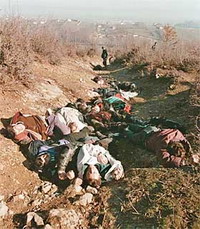Kosovo independence represents time-bomb for Balkans
America backed a plan for the independence of Serbia's breakaway province of Kosovo that represents a ticking time bomb by fomenting future conflicts in the Balkans.

"There should be no unilateral efforts to impose solutions because these Balkan nations need to live together in the future," Sergei Lavrov told reporters after a meeting with his EU counterparts.
"We need a stable resolution," he said. "We shouldn't plant a delayed action land mine under the Kosovo process."
Lavrov was referring to a controversial U.N. plan which would grant the impoverished region of two million people - 90 percent of them ethnic Albanians - virtual independence. The province has been under U.N. and NATO control since a brief aerial war in 1999 drove Serb forces out of the region.
Washington strongly supports the plan, which must be approved by the U.N. Security Council.
But Serbia and Russia have rejected the proposal, saying it runs counter to the U.N. Charter because it would dismember a sovereign state. The European Union has tried to bridge the gap, although its own 27 member states are themselves divided on the issue.
The fate of Kosovo is shaping up as one of the thorniest issues in the increasingly difficult relationship between the West and a resurgent Russia.
Russia, which holds a veto in the Security Council, has been increasingly vociferous in its opposition to the proposal. Moscow insists that it will not condone any deal not endorsed by Serbia - whose government vows never to accept Kosovo's independence.
The meeting in Luxembourg came before a crucial fact-finding visit to Kosovo by all 15 Security Council ambassadors. Their findings could set the tone for the coming debate on Kosovo and a possible vote in May or June on the U.N. plan which advocates internationally supervised independence.
The impasse is the latest irritant in relations between the West and Russia, which is reasserting itself on the international stage largely through its influence as an energy giant.
Other high-profile disagreements include U.S. plans to station elements of an anti-missile shield in Poland and the Czech Republic, a Russian ban on Polish meat which has soured relations with the European Union, as well and Russia's support for breakaway regions in Georgia and Moldova.
On Monday, EU leaders remained upbeat that they can begin negotiations for a comprehensive but delayed strategic partnership accord with Russia next month, though the biggest hurdle - the Russian ban on Polish meat and plant imports - remained unresolved after weekend talks.
EU Health Commissioner Markos Kyprianou may have failed to convince Russian Agriculture Minister Alexei Gordeyev to end the ban, EU officials said, but they remained optimistic partnership talks can be launched at a May 18 EU-Russia summit.
Poland is vetoing those talks unless Russia lifts the ban.
The EU believed it had satisfied Russia's concerns about hygiene in Polish meat and plant factories and suggested Moscow was playing politics, German Foreign Minister Frank-Walter Steinmeier said after chairing an EU foreign ministers meeting.
"I am sure there is an issue between the (Russian) foreign ministry and veterinarians" that is prolonging the import ban and holding up the partnership talks, Steinmeier told reporters.
"We have no particular interest in maintaining inadequate health conditions in one member state."
But Lavrov noted that sanitary violations in the Polish meat industry were "well-documented."
Last autumn, the EU proposed "strategic partnership" talks to secure fair trade and investment conditions in Russia for EU energy companies. It would replace a 1997 EU-Russia deal.
But at a Nov. 24 meeting with the EU leaders in Helsinki, Finland, Russian President Vladimir Putin opposed giving foreigners easy access to Russia's vast energy sources or breaking up state monopolies that pump oil and gas and ferry it to domestic and foreign clients.
Fair trade and access to energy is an issue of growing concern in western Europe, which is increasingly dependent on Russian oil and gas.
Complicating matters, Poland vetoed the start of any partnership negotiations unless Moscow ends its meat ban.
All this has soured the EU's relations with its vast eastern neighbor. It is also dismayed by what it sees as Russia's disregard for the rule of law in energy and other fields.
Subscribe to Pravda.Ru Telegram channel, Facebook, RSS!


